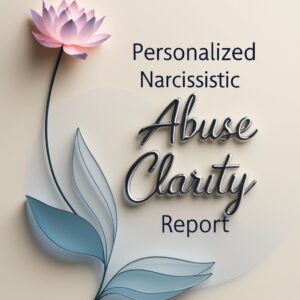Breaking Free – Healing the Invisible Chains of Trauma Bonds
$499.00
Are you trapped in a cycle of leaving and returning to someone who hurts you? Does the thought of permanent separation feel unbearable, even though you know the relationship is toxic? You’re not weak—you’re experiencing trauma bonding, a powerful biochemical attachment that makes breaking free feel impossible.
In this intensive four-session program, Mariana Martinez Vamplew, specialist in narcissistic abuse recovery, guides you through breaking these invisible chains. Using a unique blend of neuroscience-based interventions and trauma-informed techniques, you’ll understand the biology behind your attachment, learn to manage withdrawal symptoms, and develop the tools to finally break free—permanently.
Each 60-minute session builds your path to freedom, while our comprehensive support system ensures you’re never alone in your healing journey. Don’t spend another day caught in the trauma bond cycle.
“Your attachment isn’t your fault, but your freedom is your choice.” – Mariana Martinez Vamplew
Description
Do you find yourself drawn back to someone who hurts you, despite knowing better? Are you caught in a cycle of leaving and returning to a toxic relationship? Does the thought of permanent separation feel unbearable, even though the relationship causes you pain? You might be experiencing trauma bonding—a powerful biochemical attachment that keeps you tethered to someone who abuses you.
Understanding Trauma Bonds

Trauma bonds are intense emotional attachments formed through cycles of abuse, manipulation, and intermittent reinforcement. These bonds are particularly common in relationships with narcissists and other cluster B personality types, where periods of intense love-bombing alternate with devaluation and abuse. The result is a powerful addiction-like attachment that can be stronger than healthy relationships.
The Science Behind Trauma Bonding
Your attachment isn’t a sign of weakness—it’s a biochemical response to psychological manipulation. Trauma bonds are created through:
- Intense dopamine spikes during love-bombing phases
- Cortisol and adrenaline releases during abuse cycles
- Oxytocin bonds strengthened through reconciliation
- Beta-endorphin withdrawal during separation attempts
This creates a physiological dependency similar to drug addiction, making breaking free particularly challenging without specialized support.
Introducing: Breaking Free – Healing Your Trauma Bond
As a specialized therapist with extensive experience in treating survivors of narcissistic abuse and complex trauma, I’ve developed this intensive four-session program to help you understand, break, and heal from trauma bonds. This isn’t generic relationship counseling—it’s a targeted intervention designed to address the unique challenges of breaking addiction-like attachments to toxic individuals.
Program Structure: Four Transformative Sessions
Each one-hour session builds upon the previous, creating a comprehensive framework for breaking free from trauma bonds while managing withdrawal symptoms and preventing relapse.
Sessions Information
- Number of Sessions: 4
- Session Duration: 60 minutes each
- Delivery Method: Secure video platform
- Schedule: Four consecutive days
Session Breakdown
Session 1: Assessment and Understanding
Duration: 60 minutes
The first session focuses on understanding your unique trauma bond pattern and creating a foundation for recovery:
- Comprehensive assessment of your trauma bond pattern
- Identification of specific manipulation tactics used against you
- Analysis of your attachment style and how it’s been exploited
- Education about the biochemical nature of trauma bonding
- Introduction to the “Bond Breaking Compass”—a tool for navigating separation
- Development of immediate safety protocols
Homework: Daily documentation of emotional triggers and responses
Session 2: Breaking the Cycle
Duration: 60 minutes
The second session focuses on interrupting the trauma bond cycle:
- Review and analysis of your emotional trigger patterns
- Introduction of specialized grounding techniques
- Development of personalized intervention strategies
- Creation of a “Pattern Interruption Protocol”
- Implementation of emotional regulation tools
- Establishment of a support network
Homework: Implementation of pattern interruption techniques with documentation
Session 3: Managing Withdrawal
Duration: 60 minutes
The third session addresses the challenging withdrawal phase:
- Assessment of withdrawal symptom severity
- Development of symptom management strategies
- Introduction of nervous system regulation techniques
- Creation of a crisis intervention plan
- Implementation of self-soothing practices
- Development of healthy coping mechanisms
Homework: Practice of regulation techniques and withdrawal management
Session 4: Building Resilience
Duration: 60 minutes
The final session focuses on long-term recovery and relapse prevention:
- Creation of a comprehensive relapse prevention plan
- Development of healthy relationship criteria
- Establishment of strong personal boundaries
- Implementation of accountability structures
- Planning for future relationship navigation
- Creation of a long-term healing roadmap
Homework: Implementation of complete recovery toolkit with scheduled check-ins
Expert Methodology
This program integrates multiple evidence-based approaches:
- Attachment Theory: Understanding and healing disrupted attachment patterns
- Polyvagal Theory: Nervous system regulation for emotional stability
- Cognitive-Behavioral Techniques: Breaking trauma bond thought patterns
- Somatic Experiencing: Processing trauma stored in the body
- Addiction Recovery Principles: Managing withdrawal and preventing relapse
- Neuroscience-Based Interventions: Rewiring trauma bond neural pathways
Who This Program Is For
This program is specifically designed for individuals who:
- Find themselves repeatedly returning to toxic relationships
- Experience intense anxiety or physical symptoms when attempting separation
- Feel addicted to a relationship despite recognizing its harmful nature
- Have tried to leave multiple times but keep getting pulled back
- Experience intense longing or obsessive thoughts about their abuser
- Are ready to break free but need structured support to succeed
Expected Outcomes
Upon completion of this program, you can expect to:
- Understand the scientific basis of your attachment
- Recognize and interrupt trauma bond patterns
- Manage withdrawal symptoms effectively
- Develop healthy relationship expectations
- Establish strong boundaries
- Build resilience against future trauma bonding
- Create sustainable recovery practices
Beyond the Program
Recovery from trauma bonding requires ongoing support. Program participants receive:
- Comprehensive digital workbook
- Emergency response protocol
- Live chat support
Investment in Your Freedom
The complete four-session intensive program is offered at $897, reflecting its specialized nature and concentrated format. This includes:
- Four 60-minute intensive sessions
- Comprehensive recovery materials
- Emergency support protocols
Payment plans and sliding scale options are available for qualified individuals.
About Mariana Martinez Vamplew
As a specialized therapist focusing on narcissistic abuse recovery, I bring extensive experience in treating PTSD and Complex PTSD to this work. My approach combines deep understanding of Dark Triad abuse patterns with trauma-informed therapeutic techniques. Having worked with hundreds of trauma bond survivors, I understand both the challenges you face and the path to freedom.
Is This Program Right for You?
Breaking a trauma bond requires readiness and commitment. This program is most effective when you:
- Recognize the relationship as harmful
- Are willing to experience temporary discomfort for long-term freedom
- Can commit to four consecutive daily sessions
- Are ready to implement new strategies between sessions
- Have support people in your life (or are willing to build a support network)
Ready to Break Free?
Breaking a trauma bond isn’t about willpower—it’s about understanding the science of these attachments and implementing proven strategies for breaking free. Whether you’re currently in a trauma-bonded relationship or struggling with attachment to a former abuser, this program provides structured support for your journey to freedom.
To schedule your first session or complimentary consultation, please use the secure booking link below. All sessions are conducted via secure video platform for your safety and convenience.
Remember: Your attachment isn’t your fault, but your freedom is your choice. With the right support and understanding, you can break free from trauma bonds and create the healthy relationships you deserve.
Be the first to review “Breaking Free – Healing the Invisible Chains of Trauma Bonds”
You may also like…
-
Sale!

Reality Reclamation – Breaking Free from Gaslighting
Original price was: $750.00.$450.00Current price is: $450.00. -
Sale!







Reviews
There are no reviews yet.